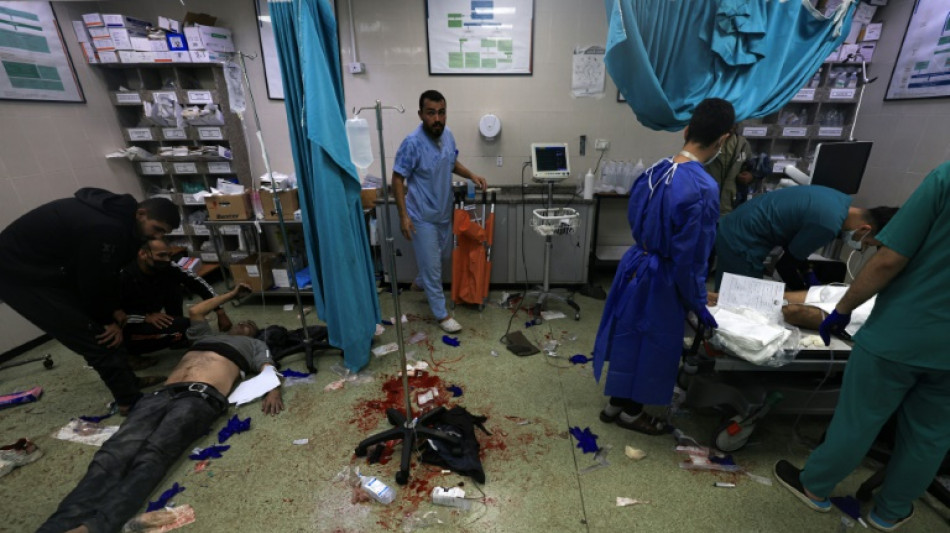
-
 US students 'race' sperm in reproductive health stunt
US students 'race' sperm in reproductive health stunt
-
Wikileaks founder Assange joins crowds for pope funeral

-
 Leader Marc Marquez claims Spanish MotoGP sprint victory
Leader Marc Marquez claims Spanish MotoGP sprint victory
-
Celtic win fourth successive Scottish Premiership title

-
 Jackson ends drought as Chelsea boost top five push
Jackson ends drought as Chelsea boost top five push
-
Warholm sets 300m hurdles world record in Diamond League opener

-
 Major blast at south Iran port kills 4, injures hundreds
Major blast at south Iran port kills 4, injures hundreds
-
Russia says retook Kursk from Ukraine with North Korean help

-
 Francis laid to rest as 400,000 mourn pope 'with an open heart'
Francis laid to rest as 400,000 mourn pope 'with an open heart'
-
Trump, Zelensky meet on sidelines of pope's funeral

-
 'Shared loss': Filipino Catholics bid Pope Francis farewell
'Shared loss': Filipino Catholics bid Pope Francis farewell
-
Families unable to reunite as India-Pakistan border slams shut
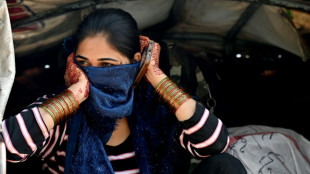
-
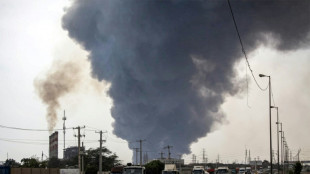 Major blast at south Iran port injures hundreds
Major blast at south Iran port injures hundreds
-
Foreign carmakers strive for 'China Speed' to stay in race

-
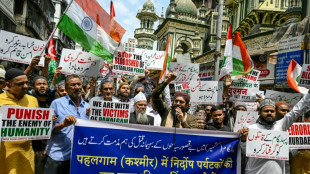 Pakistan says open to neutral probe into Kashmir attack after India threats
Pakistan says open to neutral probe into Kashmir attack after India threats
-
Hundreds of thousands at funeral mourn pope 'with an open heart'
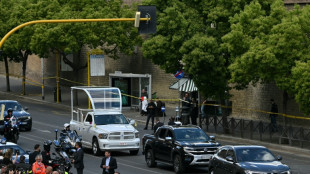
-
 Quartararo sets Spanish MotoGP record to claim pole
Quartararo sets Spanish MotoGP record to claim pole
-
Hamas says open to 5-year Gaza truce, one-time hostages release
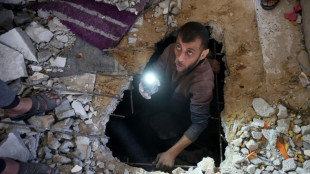
-
 Iran, US hold new round of high-stakes nuclear talks
Iran, US hold new round of high-stakes nuclear talks
-
Up at dawn for front-row seat to history at Francis's funeral

-
 Pakistan ready to 'defend sovereignty' after India threats
Pakistan ready to 'defend sovereignty' after India threats
-
Huge crowds flock to Vatican for Pope Francis's funeral

-
 Xi says China must 'overcome' AI chip challenges
Xi says China must 'overcome' AI chip challenges
-
Indian army says new exchange of gunfire with Pakistan

-
 Epstein accuser Virginia Giuffre takes own life in Australia: family
Epstein accuser Virginia Giuffre takes own life in Australia: family
-
Hundreds of buildings damaged, dozens injured in 6.3 Ecuador quake

-
 India and Pakistan's Kashmir fallout hits economy too
India and Pakistan's Kashmir fallout hits economy too
-
Francis's funeral to be grand farewell to 'pope of the poor'

-
 Pogacar faces defiant Evenepoel at Liege-Bastogne-Liege
Pogacar faces defiant Evenepoel at Liege-Bastogne-Liege
-
Chelsea eye great escape against Barcelona in Women's Champions League

-
 Iran, US to hold new round of high-level nuclear talks
Iran, US to hold new round of high-level nuclear talks
-
'Energy and effort' pay off for Reds as Blues' woes continue

-
 Albatross and closing birdie lift China's Liu to LPGA Chevron lead
Albatross and closing birdie lift China's Liu to LPGA Chevron lead
-
On the horizon? Wave of momentum for high seas treaty

-
 New to The Street Launches For The Causes(TM) Monthly Awareness Segments: Offering Free National Media to Charities and Organizations
New to The Street Launches For The Causes(TM) Monthly Awareness Segments: Offering Free National Media to Charities and Organizations
-
Top Mistakes to Avoid When Building Credit History

-
 Developing countries should fast-track US trade deals: World Bank president
Developing countries should fast-track US trade deals: World Bank president
-
Grizzlies' Morant 'doubtful' for must-win game 4 v Thunder

-
 Trump in Rome for pope funeral in first foreign trip of new term
Trump in Rome for pope funeral in first foreign trip of new term
-
Trump says Russia-Ukraine deal 'very close' after new Kremlin talks

-
 US rookies lead PGA pairs event with McIlroy and Lowry in hunt
US rookies lead PGA pairs event with McIlroy and Lowry in hunt
-
Trump tariff promises get a reality check

-
 Warriors coach Kerr 'relatively optimistic' injured Butler will play game 3
Warriors coach Kerr 'relatively optimistic' injured Butler will play game 3
-
Postecoglou hopes 'Stonecutter's Credo' can inspire Spurs

-
 PSG lose unbeaten Ligue 1 record ahead of Arsenal showdown
PSG lose unbeaten Ligue 1 record ahead of Arsenal showdown
-
Venezuela accuses El Salvador president of 'human trafficking'

-
 Own goal takes Sundowns to African final against Pyramids
Own goal takes Sundowns to African final against Pyramids
-
Scores of buildings damaged, 20 injured in Ecuador quake

-
 US stocks extend rally as market eyes busy calendar next week
US stocks extend rally as market eyes busy calendar next week
-
Pope's death triggers surge of disinformation he fought against


Chaos in south Gaza hospitals after new Israeli strikes
Patients lie on cold, bloodstained floors in hospitals filled to overflowing. Some scream in pain, but others lie silently, deathly white, too weak even to cry out.
Hospitals in the southern Gaza Strip have descended into chaos since the resumption of the war between the Palestinian militant group Hamas and Israel.
After eight weeks of war, interrupted only by one seven-day pause that ended on Friday, the doctors are exhausted.
Fuel reserves have almost run dry because of Israel's blockade of the territory, so doctors are forced to choose when and where across their hospitals to run generators.
According to the United Nations, not a single hospital in the territory's north can currently operate on patients.
The most seriously wounded are transferred daily to the south by convoys organised by the International Committee of the Red Cross.
But even there, the UN says, the 12 remaining hospitals are only "partially functional".
Abdelkarim Abu Warda and his nine-year-old daughter Huda have just arrived at Deir al-Balah Hospital aboard one of the ICRC convoys.
On Friday, after the truce ended, an Israeli strike hit their house in the vast Jabalia refugee camp in the north.
Huda was wounded in the head. "She had a brain haemorrhage -- she was placed on a ventilator," her father told AFP.
Since then, "she hasn't responded to anything", he says, lifting up the little girl's arms.
"She doesn't answer me any more," he repeats, sobbing.
- No words -
It is daybreak and the first prayers for the dead are being performed.
A few dozen men gather in front of white body bags lined up on the ground.
Between two larger bags lies the small shroud of a child, close to his or her parents even in death.
Women in tears crouch down to touch a face or kiss a loved one for one last time before the bodies are carefully loaded into the back of a pickup.
"It's Adam going... and there is Abdullah," says one woman, weeping.
At the Nasser hospital in Khan Yunis, the largest medical facility in southern Gaza, the story is the same.
World Health Organization chief Tedros Adhanom Ghebreyesus said on Sunday he was unable to "find words strong enough" to express his concerns about the conditions there.
Members of a WHO team who visited found it packed with 1,000 patients, three times its capacity.
Patients were being treated on the floor "screaming in pain", with "countless people... seeking shelter, filling every corner", the WHO chief wrote.
Israel unleashed its air and ground campaign in response to Hamas's October 7 attack on southern Israel, which killed around 1,200 people and saw some 240 kidnapped, Israeli officials say.
The Hamas government that runs Gaza says the Israeli campaign has killed more than 15,500 people -- including 280 medical staff -- since it began eight weeks ago.
- 'Saw the bomb fall' -
Israel, which has vowed to eliminate Hamas, says it is now focusing on the southern city of Khan Yunis.
The army drops warning leaflets on neighbourhoods due to be targeted each day, telling residents that a "terrible attack is imminent" and ordering them to leave.
Each day, too, the warnings move closer to the hospital.
With each new explosion that shakes the city, more casualties arrive, often in private cars.
Staff race out with stretchers which are often still stained with blood from the previous patient.
Some bodies arrive unaccompanied, and so cannot even be identified.
In the corridors, families, the wounded and medical staff all jostle together.
Some tend to the patients, sliding a sweater or a T-shirt under the head of an wounded person lying on the hard floor.
Ehab al-Najjar, a man with several family members both alive and dead at the hospital, lets his anger explode.
"I came home and saw the bomb fall on our house. Women, children died. What did they do to deserve this?" he screams.
J.Oliveira--AMWN



